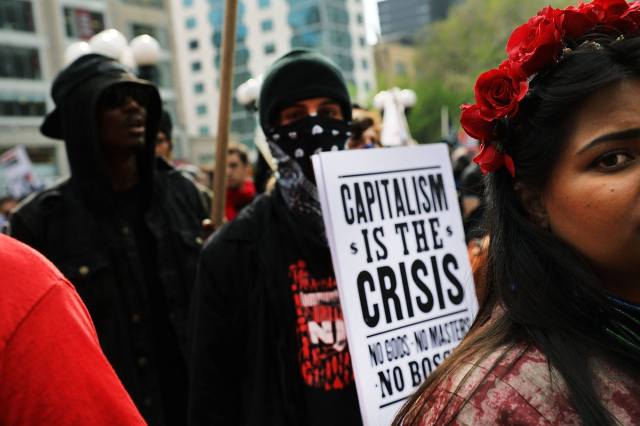Credit: Spencer Platt/Getty Images

Reading lists used to mark the start of an intense period of school work or study, now they herald a period of rest. If we’re honest, most of us have an ever-growing bookshelf of un-thumbed books that we never quite got around to reading, and an end of year guilt that – once again – we’ve fallen behind. And on the economics front, 2018 was a bumper year.
An eminent Financial Times journalist found himself in hot water when a young group of pluralist economists, including a colleague of mine, Dr Carolina Alves, pointed out that his “recommended reads” were bereft of books by women, as well as being rather Western-centric. In response, they pulled together an alternative reading list, and submitted an open letter to the Financial Times. Their list is well worth a look, alongside the brilliant Diane Coyle’s ‘Enlightened Economist’ list.
To these I will add my own list, including not only those books that hit the limelight last year, but also some that have been a bit more overlooked.
For those interested in why some of us are contrarians while others are copycats, and why it matters to the economy (and not just the stock market), I recommend Michelle Baddeley’s Copycats and Contrarians. For readers passionate about individual freedom, and who want to hear from those marginalised within our society, whose freedoms are trampled on, including by dogooders who claim to help them, then Revolting Prostitutes by Juno Mac and Molly Smith is a must read. And while we’re taking a rest from work, Andrea Komlosy’s Work: the last 1,000 years helps us to reflect on what work is and how that’s changed over time.
If you’re speculating on what the ‘great economists’ would do in response to the many problems facing modern day economies, then take a look at Linda Yueh’s recently published and very readable book on the topic. The great women economists of history – like those today – are shockingly overlooked by the economics profession. Fortunately, Routledge have just published a Handbook of the History of Women’s Economic Thought, edited by Kirsten Madden and Robert Dimand. It is expensive and academically intense, but it is a much needed addition to any economist’s bookshelf.
For a critical perspective on modern day economic thought, try Mariana Mazzucato’s The Value of Everything: Making and Taking in the Global Economy, or Richard Koo’s The Other Half of Macroeconomics and the Fate of Globalization.
Naturally, many authors had much to say about populism, Trump and Brexit, along with reflecting on the global financial crisis of a decade ago. Top picks include Isabel Sawhill’s The Forgotten Americans, Gerald Gordon’s Understanding Community, Economic Growth and Decline, Eric Kaufmann’s Whiteshift, Barry Eichengreen’s The Populist Temptation, Paul Collier’s The Future of Capitalism and Adam Tooze’s Crashed, many of which quite rightly draw on economic history to reflect on the present. And for a longer view, Nick Crafts weaves together the thoughts and findings of a career spent studying the rise and decline of the British economy in his Forging Ahead, Falling Behind and Fighting Back, which spans the Industrial Revolution through to the financial crisis.
It is also well worth keeping an eye on one of the big new trends in development economics and economic history: religion and the economy. Not since Max Weber’s The Protestant Ethic and the Spirit of Capitalism has this area attracted so much interest, particularly amongst economists who have spent years ignoring social and cultural factors. Sriya Iyer, a colleague from the University of Cambridge, looks at India, whilst Jared Rubin’s book, published last year, takes on the Middle East. Looking ahead to next year, Mark Koyama and Noel Johnson’s Persecution and Toleration explores how and why religious freedom developed in the West.
Finally, if you’re looking to start this new year on an optimistic note, I will be sitting down to read, and hoping to draw inspiration from, How change happens by Leslie Crutchfield, after a long and busy year writing my own book, due out in the spring.










Join the discussion
Join like minded readers that support our journalism by becoming a paid subscriber
To join the discussion in the comments, become a paid subscriber.
Join like minded readers that support our journalism, read unlimited articles and enjoy other subscriber-only benefits.
Subscribe